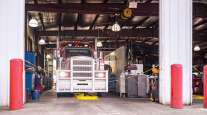All-Electric Trucks Present Training Challenges
All-electric Class 8 tractors can present new challenges for maintenance shops, including the training of technicians, but fleets said they expect overall maintenance requirements to decrease.
Ryder System Inc. has no plans to outsource maintenance for the all-electric vehicles it’s adding to its fleet, including the Class 8 Tesla vehicles it has preordered. The fleet already rolled out training on electric vehicles to its technicians nationwide, with a focus on safety.
“These systems have incredibly high voltages,” said Chris Nordh, senior director of advanced vehicle technology for Ryder.
While maintenance could be easier in the long term, it can be more complicated initially as technicians learn the systems.
“You have a much more advanced system, so we are utilizing our more advanced technicians to work on these because it is so different and requires a new set of skills,” Nordh said. “Generally speaking, there will be less maintenance required from either a dollar perspective from an internal combustion engine or labor hours.”
Jack Legler, technical director for American Trucking Associations’ Technology & Maintenance Council, said shops planning to work on electric vehicles will require new tooling, diagnostics equipment and technician training. Fleets also may have to decide what maintenance they will do in-house and what they will send back to the equipment manufacturer.
“It is completely different when you’re dealing with wholly electric or even hybrid,” he said. “The powertrain itself may be something you don’t even want to work on in your shop.”
Rae Lyn Rushing, a spokeswoman for FedEx Corp., said the company will work with Tesla to determine the extent to which the electric powertrain components will be serviceable by its own technicians.
And UPS Inc. will know more about maintenance needs as it builds up more history with electric Class 8s, said Rick Jordan, UPS automotive senior director of maintenance and engineering for delivery fleet. “We expect that we will be able to take advantage of maintenance savings as we go down the road.”
Craig Jacobs, director of new product introduction at Eaton eMobility, said overall maintenance costs should be lower because there are fewer moving parts and wear items on all-electric vehicles versus diesel-powered trucks. He added that he believes components on electric tractors will break less frequently, but when they do, larger chunks of the powertrain will have to be replaced.
Performing maintenance on electric vehicles may be more difficult for service providers that could see different types of vehicles, all of which may require different types of chargers, TMC’s Legler said, noting there are several types of charging connectors that manufacturers use. “You have to think about that.”




